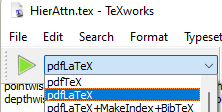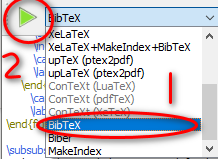Arxiv preprint generation and jounral sharing rules
Last updated on:3 years ago
For a wider impression on the community, we often publish our manuscript to the public (e.g., arxiv) before it is accepted by a journal.
Latex bbl file generation for arxiv citation system
LaTeX forum ⇒ General ⇒ no .bbl file generated
Run LaTeX to generate the AUX file. It adds a line every time it finds a cite.
Then run BibTeX (executable: BibTeX) to generate the BBL (from the AUX lines).
Then rerun LaTeX to make any updates corresponding to including the possibly massive BBL (e.g., updating your final page count on each of your pages, updating your ToC, etc.). It will include the BBL.

Article sharing rules
Even though all publishers have their big rules on article sharing, the rules may be different for a specific journal.
Elsevier
Preprint
- Authors can share their preprint anywhere at any time.
- If accepted for publication, we encourage authors to link from the preprint to their formal publication via its Digital Object Identifier (DOI). Millions of researchers have access to the formal publications on ScienceDirect, and so links will help your users to find, access, cite, and use the best available version.
- Authors can update their preprints on arXiv or RePEc with their accepted manuscript .
Please note: - Some society-owned titles and journals that operate double-blind peer review have different preprint policies. Please check the journals Guide for Authors for further information.
- Preprints should not be added to or enhanced in any way in order to appear more like, or to substitute for, the final versions of articles.
Accepted Manuscript
Authors can share their accepted manuscript:
Immediately
- via their non-commercial personal homepage or blog
- by updating a preprint in arXiv or RePEc with the accepted manuscript
- via their research institute or institutional repository for internal institutional uses or as part of an invitation-only research collaboration work-group
- directly by providing copies to their students or to research collaborators for their personal use
- for private scholarly sharing as part of an invitation-only work group on commercial sites with which Elsevier has an agreement
After the embargo period - via non-commercial hosting platforms such as their institutional repository
- via commercial sites with which Elsevier has an agreement
In all cases accepted manuscripts should: - link to the formal publication via its DOI
- bear a CC-BY-NC-ND license – this is easy to do
- if aggregated with other manuscripts, for example in a repository or other site, be shared in alignment with our hosting policy
- not be added to or enhanced in any way to appear more like, or to substitute for, the published journal article
Published Journal Article
Policies for sharing published journal articles differ for subscription and gold open access articles:
Subscription articles
- If you are an author, please share a link to your article rather than the full-text. Millions of researchers have access to the formal publications on ScienceDirect, and so links will help your users to find, access, cite, and use the best available version
- If you are an author, you may also share your Published Journal Article (PJA) privately with known students or colleagues for their personal use
- Theses and dissertations which contain embedded PJAs as part of the formal submission can be posted publicly by the awarding institution with DOI links back to the formal publications on ScienceDirect
- If you are affiliated with a library that subscribes to ScienceDirect you have additional private sharing rights for others’ research accessed under that agreement. This includes use for classroom teaching and internal training at the institution (including use in course packs and courseware programs), and inclusion of the article for grant funding purposes
- Otherwise sharing is by agreement only
- The Published Journal Article cannot be shared publicly, for example on ResearchGate or Academia.edu, to ensure the sustainability of peer-reviewed research in journal publications.
Gold open access articles - May be shared according to the author-selected end-user license and should contain a CrossMark logo, the end user license, and a DOI link to the formal publication on ScienceDirect
In short
Preprint
This is the author’s own write-up of research results and analysis that has not been peer reviewed, nor had any other value added to it by a publisher (such as formatting, copy-editing, technical enhancements, and the like).
Accepted manuscript
An accepted manuscript is the manuscript of an article that has been accepted for publication and which typically includes author-incorporated changes suggested during submission, peer review, and editor-author communications. They do not include other publisher value-added contributions such as copy-editing, formatting, technical enhancements and (if relevant) pagination.
Published journal article
A published journal article (PJA) is the definitive final record of published research that appears or will appear in the journal and embodies all value-adding publisher activities including peer review co-ordination, copy-editing, formatting, (if relevant) pagination, and online enrichment.
An example Medical image analysis
Preprints
Please note that preprints can be shared anywhere at any time, in line with Elsevier’s sharing policy.
Sharing your preprints e.g. on a preprint server, will not count as prior publication (see ‘Multiple,
redundant or concurrent publication’ for more information).
License
How to add another Creative Commons license to an arXiv paper:
We currently support three of the Creative Commons licenses. If you wish to use a different CC license, then select arXiv’s non-exclusive license to distribute in the arXiv submission process and indicate the desired Creative Commons license in the actual article.
From the arXiv webpage about licenses.
https://arxiv.org/help/license
How to indicate the desired Creative Commons license according to Elsevier:
Elsevier requires authors posting their accepted manuscript to attach a non-commercial Creative Commons user license (CC-BY-NC-ND). This is easy to do. On your accepted manuscript add the following to the title page, copyright information page, or header /footer: © YEAR. Licensed under the Creative Commons [insert license details and URL].
IEEE
Preprint
Authors who have submitted or plan to submit their articles to IEEE may post their preprints in the following locations:
Author’s personal website
Author’s employer’s website or institutional repository
arXiv.org, TechRxiv.org, or any not-for-profit preprint server approved by the Publication Services and Products Board (PSPB)
IEEE does not consider this to be a form of prior publication. The following statement must be included on the initial screen:
“This work has been submitted to the IEEE for possible publication. Copyright may be transferred without notice, after which this version may no longer be accessible.”
Upon acceptance of the article by IEEE, the author must replace the posted preprint article with either (1) the full citation to the IEEE work with the DOI, or (2) the accepted version of the article with the DOI and an appropriate copyright notice (as described in the “accepted article” section below). No other changes may be made to the accepted article.
Reference
no .bbl file generated
Arxiv 论文提交流程——看这篇就够了
Article Sharing
Which license should be chosen in arXiv for a paper to be published in Elsevier?
https://www.elsevier.com/about/policies/sharing
Post-Publication Policies
本博客所有文章除特别声明外,均采用 CC BY-SA 4.0 协议 ,转载请注明出处!